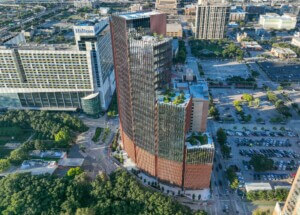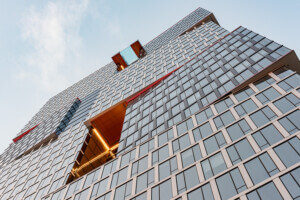Copenhagen-based Bjarke Ingels Group (BIG), London-based Zaha Hadid Architects, and four others have been named as winners of the 2016 Aga Khan Award for Architecture. The Danish architect claimed the prize for his Superkilen project in Copenhagen, Denmark, meanwhile Hadid for her design for the Issam Fares Institute at the American University of Beirut in Lebanon.
The announcement was made in the capital of the UAE in Abu Dhabi earlier today. Awarded every three years, the prize has become a heavily cherished trophy since its inauguration in 1977 when Aga Khan established the award to recognize building concepts found in predominantly Muslim communities. For this year’s award, a jury drew up a shortlist of 19 projects, born from 348 nominations. The prizes awarded are as follows:
Superkilen
Copenhagen, Denmark
Bjarke Ingels Group, Topotek 1, and Superflex
Words from the jury: “A public space promoting integration across lines of ethnicity, religion and culture.“
Bait Ur Rouf Mosque
Dhaka, Bangladesh
Marina Tabassum
Words from the jury: “A refuge for spirituality in urban Dhaka, selected for its beautiful use of natural light.”
Friendship Centre
Gaibandha, Bangladesh
Kashef Mahboob Chowdhury/URBANA
Words from the jury: “A community center which makes a virtue of an area susceptible to flooding in rural Bangladesh.“
Cha’er Hutong Children’s Library and Art Centre
Beijing, China
ZAO/standardarchitecture / Zhang Ke
Words from the jury: “A children’s library selected for its embodiment of contemporary life in the traditional courtyard residences of Beijing’s Hutongs.“
Tabiat Pedestrian Bridge
Tehran, Iran
Diba Tensile Architecture / Leila Araghian, Alireza Behzadi
Words from the jury: “A multi-level bridge spanning a busy motorway has created a dynamic new urban space.“
Issam Fares Institute
Beirut, Lebanon
Zaha Hadid Architects
Words from the jury: “A new building for the American University of Beirut’s campus, radical in composition but respectful of its traditional context.“










